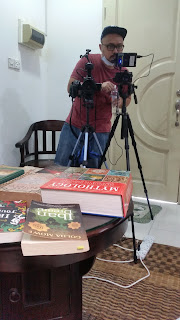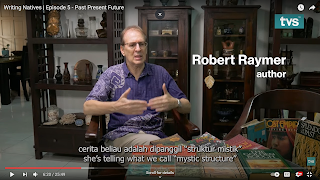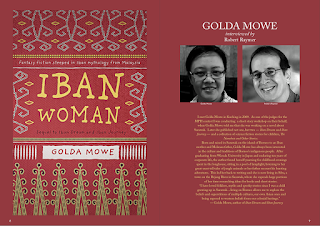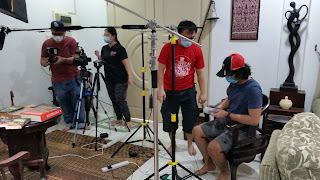Congrats to Golda Mowe on being featured on Past Present Future Episode 5: Writing Natives, which aired 4 August 2021 on TV Sarawak (TVS).
Having come across my author-to-author interview with Golda, Deborah Christopher, who studied Cinematography at Universiti Malaysia Sarawak (UNIMAS) where I taught for a number of years, asked me if I was interested in being interviewed for a documentary featuring Golda Mowe. Golda, from Sarawak, is the author of the novels Iban Dream, Iban Journey and Iban Women.
Deborah is the co-producer for a documentary series named Past, Present, and Future, a project funded by TVS. Each episode highlights different stories of Sarawak personalities who have incorporated their culture and traditions from the past into their present (and future) careers or projects.
I was glad to hear that Golda Mowe was being featured since she is underappreciated and deserves a wider audience. I was impressed by her discipline, her persistence and her willingness to rewrite. Many Malaysian writers do not seem to want to put in the extra work, thinking it is good enough for Malaysia. The good ones, like Golda and others that I have interviewed who want to attract an international audience, know better.
Due to the on-going pandemic, the project was delayed. Then last year the film crew nearly got locked down in Sibu while interviewing Golda. Meanwhile, I made a list of things to do before the filming: reread Iban Dream and purchase and read the other two novels in the series; prepare for the interview by coming up with something interesting to say; make notes, reminders of what I need to do the week and the day before the shoot (including domestic chores—sweeping, dusting, cleaning the living room); and more reminders for the morning of the shoot itself (arrange mythology books on table, make sure I have handy everything I may need—water bottle, pen and notebook, outline of my talk in case I go blank.
After reading Golda’s three novels, I learned a lot about Iban myths, their fears and dreams, their omens and taboos, their customary laws (cannot refuse a visitor if he makes a request to stay at your longhouse and cannot refuse food offered to you), the significance of weaving patterns (and the harmful risks of trying to weave above your skill level) and also retribution, an obligation to take avenge if one of your relatives was killed. Also, that the ideal matrimonial match should be between a feared headhunter and a gifted weaver.
For the documentary I was asked to talk about Golda, her writing, and her life journey, which got me to thinking in terms of The Writer’s Journey, Mythic Structure for Writers, a book by Christopher Vogler, which I picked up at a writing conference in Maui, along with a companion book, Myth and the Movies, Discovering the Mythic Structure of 50 Unforgettable Films by Stuart Voytilla.
Vogler, inspired by the work of Joseph Campbell, author of Hero with a Thousand Faces, discusses the use of archetypes such as the Hero, the Mentor, the Threshold Guardians, the Herald, the Shapeshifter (gods and demons), the Shadow and the Trickster. Also the Mystic Structure and Stages of the Journey: Ordinary World; Call to Adventure; Refusal of the Call; Meeting with the Mentor; Crossing the First Threshold; Tests, Allies, Enemies; Approach to the Innermost Cave; Ordeal; Reward (Seizing the Sword); The Road Back; Resurrection; Return with the Elixir.
This mystic structure can be applied to nearly every story from adventures to romance to slapstick comedy, even to animation such as Disney’s The Lion King.
To prepare myself for the documentary, I broke my presentation into four parts: (1) Golda’s use of mythology; (2) her plots and themes; (3) her personal writer’s journey and how we met (MPH workshop that I conducted in 2009); and (4) her writing in Sarawak and publishing in Singapore. I had written a blog about publishing books in Malaysia and Singapore.
A common theme in all three of Golda’s novels is the hero being made a scapegoat or an outcast—you against the world (both visible and invisible). The hero, even as a child, is often forced to undertake the ‘hero’s journey’, like Tarzan, or Mowgli in The Jungle Book, or Simba in The Lion King, often cast out unfairly by society. In Golda’s Iban Dream, the child Bujang, is raised by an orangutan…destined to be a great warrior. All three novels are connected by a cursed family line and each hero/heroine sets out to prove that they are not cursed, to right wrongs.
Deborah and Jeremy Emang (the producer and director), along with the rest of the crew, Shawn and Elisha, arrived at my house for the half-day shoot. They proceeded to set up the camera and lights and the rest of their equipment in one section of our living room, aimed at me sitting at a round table and with several coffee table books on mythology and lost cities, lost empires, including Homer’s The Iliad and The Odyssey, with a nice backdrop of collected items from my travels.
Once the filming began, I proceeded to talk about Golda’s personal hero’s journey as a writer and her own mystic journey, some of which I had learned from my research from my previous interview.
Then I spoke about the hero’s journey within her stories and how it dates back to ancient Greeks, which she, coincidentally talked about during her own segment. When most people think of mythology, they often limit themselves to Greek and Roman mythology, dating back to the Trojan War. But every culture has their own mythology, and Golda Mowe wrote about the Iban mythology that is important to her. She writes about what she knows, what she has learned, and from her meticulous research to get the details of her rich Iban heritage correct. It’s these details that make her fantasy novels palpable. As a reader, we are caught up in their journeys, their quests, their battles with demons and headhunters.
I continued to talk until I heard an all too familiar jingle from an ice-cream truck. Knowing that sound equipment for the filming could pick it up, I took a much-needed break and drink of water. We waited several minutes until the vendor made his rounds and took away his jingle.
I picked up where I left off and continued to say what I felt needed to be said on Golda’s behalf. I had done my homework and was well prepared. After the interview, Jeremy told me that he had written a list of questions but I had answered all of them as I spoke, so there was no need to interrupt me. He could relax, check off each unasked question, and concentrate on the filming.
 |
| Jeremy Emang |
A few weeks later, Deborah contacted me to borrow my three Golda Mowe books for another shot (since Golda was still in Sibu) and promptly returned the books. During the actual documentary, I appeared four times; however, I was bleeped only once. What I said was the right word for the context (bullsh…ing). I thought they would cut it from the actual documentary. Instead, I have my first recorded ‘bleep’ caught on film, a badge of honor.
Although I didn’t get a chance to meet Golda again, it was good to see her on film. Since she did all the hard work, the research and writing her books, she deserves all the credit for her well written books about Ibans in Sarawak. I wish her all the best with her writing and hope she continues her hero’s journey that all writers must undertake if they dare to dream and write and see their work published.
—Borneo Expat Writer
Ivy
Ngeow author of Cry of the Flying Rhino, winner of the 2016 Proverse
Prize.
Preeta
Samarasan, author of Evening is the Whole Day, finalist
for the Commonwealth Writers Prize 2009.
Chuah
Guat Eng, author of Echoes of Silence and Days of
Change.
Also, Malachi
Edwin Vethamani, author of Complicated Lives and Life
Happens.
Five part Maugham
and Me series
Trust the Novel Writing (and rewriting)Process.










1 comment:
Great information about expat
Post a Comment